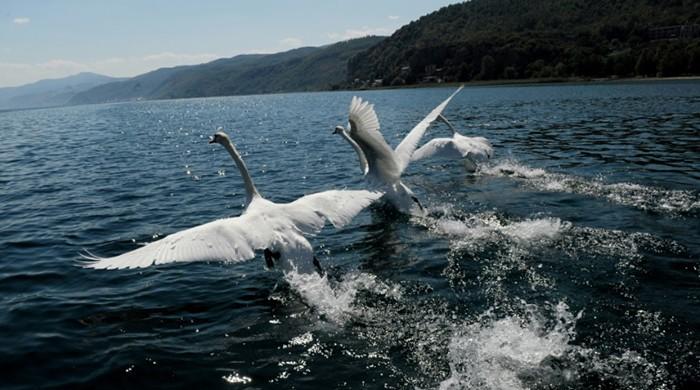
A fishing boat glides across the shimmering surface of Europe's oldest lake, a haven of biodiversity and a UNESCO World Heritage Site -- one that conservationists warn faces multiple development threats.
Lake Ohrid, which straddles the mountainous border of Macedonia and Albania, has been in existence for up to three million years and is home to more than 200 species of flora and fauna found nowhere else in the world.
But huge infrastructure plans on the Macedonian side have alarmed environmentalists and the United Nation's cultural agency UNESCO, which has called on the country's authorities for an urgent assessment of the potential cumulative damage.
The proposals include a large ski complex and an expressway through the lakeside Galicica National Park, itself a protected area home to thousands of plant and animal species.
Local activists are also incensed by proposed "touristic development zones" and other urbanisation plans on Ohrid's shores, including a marina and apartment buildings.
They fear the destruction of a 50-hectare (120-acre) wetland serving as a crucial natural filter to the lake, pointing to a draft impact assessment, commissioned by the local government, that warns of unavoidable damage.
Officials insist they will protect Ohrid's heritage, but campaigners accuse them of manipulation and violating laws to allow such developments to go ahead.
The "tsunami" of planned infrastructure projects, if implemented, "means that you can just say goodbye to the UNESCO World Heritage Site," said Aleksandra Bujaroska, an environmental lawyer in the Balkan country.
Bujaroska is part of the citizens' association Front 21/42, which is campaigning for a moratorium on all of the "destructive" plans.
"The big issue with all of these procedures... is the constant breach of public participation," said the 30-year-old lawyer, who grew up in Ohrid and is based in the capital Skopje.
Byzantine beauty
UNESCO has assigned World Heritage status to more than 1,000 sites in the world, but fewer than three dozen are listed as both "natural" and "cultural" sites. The Ohrid region is one of them.
On the lake's Macedonian shores, the city of Ohrid is one of Europe's oldest human settlements with a wealth of Byzantine-style icons, frescoes and churches, which together with the lake's natural beauty drew more than 200,000 tourists last year.
"It's amazing. The beautiful thing is it's so close to nature," said visiting Polish student Aleksandra Walerych by the 13th-century Church of St John at Kaneo, which overlooks the lake and is thought to be the most photographed spot in the country.
The lake covers an area of 358 square kilometres (143 square miles), two-thirds of which lie in Macedonia and are covered by the World Heritage status and work is under way to try to extend this to the third lying in Albanian territory too.
But at its annual meeting in Istanbul in July last year, the UNESCO World Heritage Committee said it "notes with concern that a number of large-scale infrastructure projects have been proposed" on the Macedonian side.
It warned that Ohrid could find itself on the "List of World Heritage in Danger" if threats to the site were confirmed, suggesting alternative routes and locations should be identified for major projects.
Sites can lose their heritage status if they are deemed to be improperly protected.
Alexandra Fiebig, project officer for Europe and North America at UNESCO's World Heritage Centre, told AFP there had been "a lot of close contact with the (Macedonian) authorities" and a UNESCO "reactive monitoring mission" was due to start work in Ohrid soon.
'Political agendas'
Of the raft of controversial proposals, expected to involve both private and public investment, some fall under the remit of central government ministries while others are part of municipal plans.
The European Bank for Reconstruction and Development, a potential investor in the expressway, says it is "assessing the feasibility" of the project.
Macedonia's conservative VMRO-DPMNE party, in power nationally since 2006, has been accused by critics of authoritarianism and corruption but narrowly won a general election in December.
Ohrid's mayor Nikola Bakraceski, from VMRO-DPMNE, insists environmental regulations have been followed and the public sufficiently consulted in city planning. He accuses activists of having "political agendas" and lacking expertise.

No comments:
Post a Comment